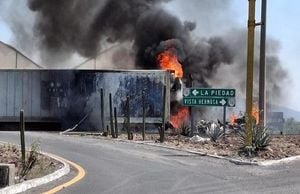Montreal has recently been grappling with significant disruptions caused by major water main breaks near the Jacques-Cartier Bridge. This unfortunate event led to widespread flooding, impacting not only roadways but also residential areas across the eastern half of the city.
On August 16, 2024, the Montreal authorities imposed a boil-water advisory, advising hundreds of thousands of residents to heat their tap water before consuming it. This was enforced as the crisis unfolded, illustrating the gravity of the situation.
The flooding occurred after several water mains burst, with the most severe damage reported near the busy bridge area. Streets became rivers, traversing the city as water gushed uncontrollably, with emergency services working fervently to mitigate the chaos.
City officials are overwhelmed by the extent of the damage, leading to hazardous conditions for motorists and pedestrians alike. Local authorities urged residents to refrain from driving through flooded areas to avoid becoming trapped.
This incident highlighted the region’s aging infrastructure, which has faced increasing challenges from year to year. Experts suggest these frequent interruptions may be related to Montreal's shifting climate and increased rainfall.
Montreal Mayor Valérie Plante expressed deep concern for the residents affected by the flooding. She reassured the public of the city's commitment to rapidly address the problem and restore normalcy.
While utility workers were deployed to repair the damage, residents anxiously awaited updates on when water service would be fully restored. Efforts to assess the damage have been intensifying, as the focus shifts toward immediate repairs and long-term solutions.
The public health department's boil-water advisory remains effective until water quality tests confirm its safety for consumption. Residents have been advised to stock bottled water as the heads of various departments coordinate their responses to the crisis.
Some neighborhoods witnessed water levels rising alarmingly, prompting the deployment of sandbags to try to fortify against the incursion. Many residents took to local social media platforms to share images and videos of their houses and streets temporarily transformed by the unexpected deluge.
Officials noted they were actively monitoring plumbing throughout the city. They are testing for any potential contaminants resulting from the flooding, as concerns grow about the presence of bacteria such as E.coli.
To summarize the situation, Montreal is currently facing what could be described as a series of unfortunate events. City planners are now under pressure to rethink infrastructure strategies critically.
There is widespread agreement on the need for modernization of the water systems, which have shown their vulnerabilities during this incident. Residents hope this wake-up call will prompt necessary action to prevent recurrence.
The massive cleanup efforts are expected to take several days, if not longer, as teams work tirelessly to restore order. Local businesses also feel the impact of the flooding, with many being forced to close temporarily due to waterlogged conditions.
Community leaders have stepped forward, organizing local initiatives to assist those directly affected by this flooding. Volunteer groups are actively gathering supplies and distributing food and bottled water to families displaced by the event.
Montreal’s winter months add another layer of difficulty as residents brace for possible complications from the water main breaks. Already, discussions about infrastructure improvements become increasingly urgent, as this incident raises many questions about preparedness for future crises.
Meanwhile, Montreal residents remain hopeful for swift resolutions and preventive measures. Many have expressed concerns over how such infrastructure failures might worsen over time if not addressed appropriately.
For now, the community appears resilient, as they rally together to support one another during this uncomfortable ordeal. City officials are adamant about implementing necessary changes to infrastructure to prevent similar incidents moving forward.
The situation serves as both a crisis and call to action for better urban management. With the looming threat of climate change, the need to revitalize Montreal’s infrastructure serves as the major takeaway from this incident.
City engineers are on high alert, prepared to identify weaknesses and address them head-on. Montreal is determined, as its residents have always been, to fend off nature’s challenges through resilience and collective effort.
This event will hopefully usher in stronger regulations and investments geared drastically toward maintaining and upgrading water systems throughout the city. Time will tell whether the lessons learned will shape future initiatives aimed at sustainability.
Even as the flooding recedes, the community ethos will shine through as people continue to help each other. Recovery will not only encompass the cleanup but also establishing safeguards for what lies on the horizon.
For now, Montreal stands united, confronting its challenges with determination and hope.



